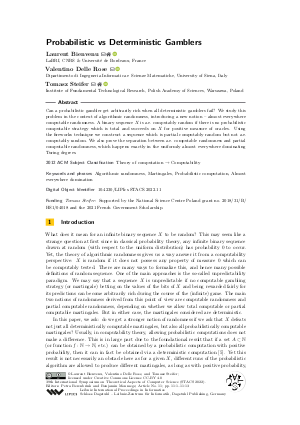Probabilistic vs Deterministic Gamblers
Authors
Laurent Bienvenu  ,
Valentino Delle Rose
,
Valentino Delle Rose  ,
Tomasz Steifer
,
Tomasz Steifer 
-
Part of:
Volume:
39th International Symposium on Theoretical Aspects of Computer Science (STACS 2022)
Part of: Series: Leibniz International Proceedings in Informatics (LIPIcs)
Part of: Conference: Symposium on Theoretical Aspects of Computer Science (STACS) - License:
 Creative Commons Attribution 4.0 International license
Creative Commons Attribution 4.0 International license
- Publication Date: 2022-03-09
File

PDF
LIPIcs.STACS.2022.11.pdf
- Filesize: 0.63 MB
- 13 pages
Document Identifiers
Subject Classification
ACM Subject Classification
- Theory of computation → Computability
Keywords
- Algorithmic randomness
- Martingales
- Probabilistic computation
- Almost everywhere domination
Metrics
- Access Statistics
-
Total Accesses (updated on a weekly basis)
0Document
0Metadata
Abstract
Can a probabilistic gambler get arbitrarily rich when all deterministic gamblers fail? We study this problem in the context of algorithmic randomness, introducing a new notion - almost everywhere computable randomness. A binary sequence X is a.e. computably random if there is no probabilistic computable strategy which is total and succeeds on X for positive measure of oracles. Using the fireworks technique we construct a sequence which is partial computably random but not a.e. computably random. We also prove the separation between a.e. computable randomness and partial computable randomness, which happens exactly in the uniformly almost everywhere dominating Turing degrees.
Cite As Get BibTex
Laurent Bienvenu, Valentino Delle Rose, and Tomasz Steifer. Probabilistic vs Deterministic Gamblers. In 39th International Symposium on Theoretical Aspects of Computer Science (STACS 2022). Leibniz International Proceedings in Informatics (LIPIcs), Volume 219, pp. 11:1-11:13, Schloss Dagstuhl – Leibniz-Zentrum für Informatik (2022)
https://doi.org/10.4230/LIPIcs.STACS.2022.11
BibTex
@InProceedings{bienvenu_et_al:LIPIcs.STACS.2022.11,
author = {Bienvenu, Laurent and Delle Rose, Valentino and Steifer, Tomasz},
title = {{Probabilistic vs Deterministic Gamblers}},
booktitle = {39th International Symposium on Theoretical Aspects of Computer Science (STACS 2022)},
pages = {11:1--11:13},
series = {Leibniz International Proceedings in Informatics (LIPIcs)},
ISBN = {978-3-95977-222-8},
ISSN = {1868-8969},
year = {2022},
volume = {219},
editor = {Berenbrink, Petra and Monmege, Benjamin},
publisher = {Schloss Dagstuhl -- Leibniz-Zentrum f{\"u}r Informatik},
address = {Dagstuhl, Germany},
URL = {https://drops.dagstuhl.de/entities/document/10.4230/LIPIcs.STACS.2022.11},
URN = {urn:nbn:de:0030-drops-158210},
doi = {10.4230/LIPIcs.STACS.2022.11},
annote = {Keywords: Algorithmic randomness, Martingales, Probabilistic computation, Almost everywhere domination}
}
Author Details
- Dipartimento di Ingegneria Informatica e Scienze Matematiche, University of Siena, Italy
Funding
- Steifer, Tomasz: Supported by the National Science Centre Poland grant no. 2018/31/B/ HS1/04018 and the 2021 French Government Scholarship.
References
-
Laurent Bienvenu. Game-theoretic characterizations of randomness: unpredictability and stochasticity. PhD thesis, Université de Provence, 2008.

-
Laurent Bienvenu and Ludovic Patey. Diagonally non-computable functions and fireworks. Information and Computation, 253:64-77, 2017.

-
Stephen Binns, Bjørn Kjos-Hanssen, Manuel Lerman, and Reed Solomon. On a conjecture of Dobrinen and Simpson concerning almost everywhere domination. Journal of Symbolic Logic, 71(1):119-136, 2006.

-
Sam Buss and Mia Minnes. Probabilistic algorithmic randomness. Journal of Symbolic Logic, 78(2):579-601, 2013.

-
Karel de Leeuw, Edward F. Moore, Claude Shannon, and Norman Shapiro. Computability by probabilistic machines. In Automata Studies. Princeton University Press, 1956.

-
Natasha Dobrinen and Stephen G. Simpson. Almost everywhere domination. Journal of Symbolic Logic, 69(3):914-922, 2004.

-
Rodney G. Downey and Denis R. Hirschfeldt. Algorithmic Randomness and Complexity. Theory and Applications of Computability. Springer New York, New York, NY, 2010.

-
Stuart Alan Kurtz. Randomness and Genericity in the Degrees of Unsolvability. PhD thesis, University of Illinois at Urbana-Champaign, 1982.

-
Donald Martin. Measure, category, and degrees of unsolvability. Unpublished manuscript, 1967.

-
Wolfgang Merkle. The complexity of stochastic sequences. Journal of Computer and System Sciences, 74(3):350-357, 2008.

-
André Nies. Computability and randomness. Oxford Logic Guides. Oxford University Press, 2009.

-
André Nies, Frank Stephan, and Sebastiaan Terwijn. Randomness, relativization and Turing degrees. Journal of Symbolic Logic, 70:515-535, 2005.

-
Andrei Rumyantsev and Alexander Shen. Probabilistic constructions of computable objects and a computable version of Lovász local lemma. Fundamenta Informaticae, 132(1):1-14, 2014.

-
Claus Schnorr. Zufälligkeit und Wahrscheinlichkeit, volume 218 of Lecture Notes in Mathematics. Springer-Verlag, Berlin-Heidelberg-New York, 1971.

-
Michiel van Lambalgen. Random sequences. PhD dissertation, University of Amsterdam, Amsterdam, 1987.

-
Liang Yu. When van Lambalgen’s theorem fails. Proceedings of the American Mathematical Society, 135(3):861-864, 2007.

